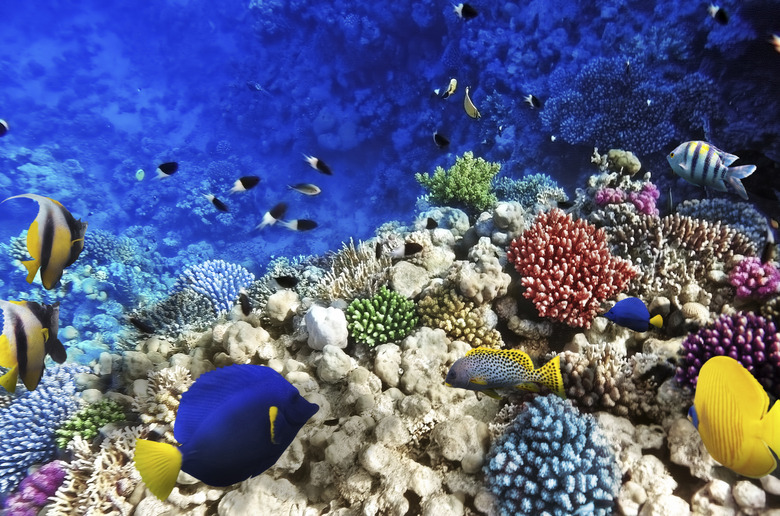What Is The pH Of Salt Water?
The pH scale is used to measure the alkalinity or acidity of a substance like water. The scale goes from 0 to 14. A pH under 7 indicates that what you're measuring is acidic, and anything over 7 is alkaline. If a substance is 7.0 in pH this means that it's exactly neutral. The pH of salt water in oceans and other natural settings is dependent on a number of different factors.
TL;DR (Too Long; Didn't Read)
Simply adding salt to water does not change the pH level of water.
Typical pH of Salt Water
Typical pH of Salt Water
The average pH of the oceans near the surface is around 8.1. This means that the oceans are more alkaline than neutral. The pH of anything is usually a delicate balance. Human blood, for example, has a pH range of 7.35 to 7.45. Even a slight change out of this range could cause damage. Saltwater in the oceans is the same way, and many environments in the oceans could be destroyed if the pH changes too much.
How Carbon Dioxide Affects Ocean pH
How Carbon Dioxide Affects Ocean pH
According to Scientific American, the planet's oceans quickly absorb as much as 30 percent of the carbon dioxide emissions mankind produces. If you measure this over a long enough time period, the figure jumps to 85 percent, since eventually most of the water and air on earth mixes with the oceans. Over the course of humanity's time on Earth around 530 billion tons of gas have been dumped into the oceans, and the current rate is around one million tons per hour. All of this carbon dioxide is making the salt water in the oceans more acidic.
Rising Oceanic Acidity
Rising Oceanic Acidity
Acidity in the oceans has increased by 30 percent since the Industrial Revolution. In fact, the average pH at the surface of the oceans before the Industrial Revolution was 8.2. This means that it's changed from 8.2 to 8.1 in just a hundred years, which is a massive shift. Previously, it took 5,000 to 10,000 years for a similar shift to occur naturally. Some projections show that carbon emissions could reduce the average pH of the oceans by up to another 0.7 by the turn of the next century.
Ecological Implications
Ecological Implications
One of the main effects of the acidification of salt water in the oceans is on coral reefs. Coral need to absorb calcium carbonate in order to keep their skeletons strong. If the oceans turn too acidic, these skeletons will dissolve and coral reefs will die. This same problem also affects any other animal that needs calcium carbonate, including clams, snails and urchins. More acidic oceans will kill off many animals that can't survive such a change, and this could drastically change the overall ecology of Earth's oceans.
Cite This Article
MLA
Morgan, Sam. "What Is The pH Of Salt Water?" sciencing.com, https://www.sciencing.com/ph-salt-water-5098328/. 5 April 2018.
APA
Morgan, Sam. (2018, April 5). What Is The pH Of Salt Water?. sciencing.com. Retrieved from https://www.sciencing.com/ph-salt-water-5098328/
Chicago
Morgan, Sam. What Is The pH Of Salt Water? last modified March 24, 2022. https://www.sciencing.com/ph-salt-water-5098328/
